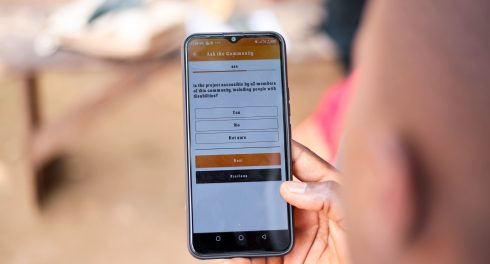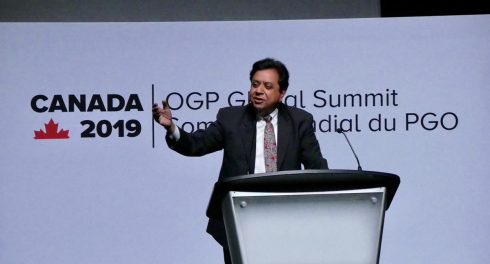Highlight
- Speed vs accountability – false choice?
- Data Wave
- The Web as Civic Tool
- Philanthropic double down?
- Just ask nice
- TAI Spotlight: Making governance more than good
Speed vs accountability – false choice?
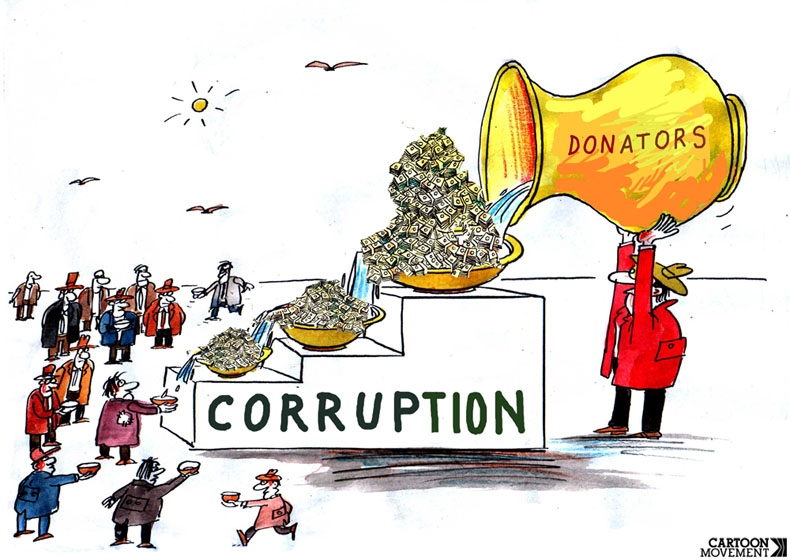
Photo: Pavel Constantin via Cartoon Movement
After a rush to enact measures against the pandemic, there is uncertainty as to the nature of some of the relief funding – and whether accountability has been sacrificed for speed. Eurodad’s Jan Van de Poel looks at all of the aid given since the start of the pandemic and finds that, while the aid has been significant, it is unclear if the aid is actual new aid or just advanced disbursements that were already committed before the start of the pandemic.
How about insisting on transparency of how aid is spent? While opportunities for corruption continue to abound in COVID relief efforts, a chorus of voices asserts that corruption is far from a necessary byproduct of saving lives, and that the game is not zero-sum. There is a possibility for both strong accountability and transparency, and effective rapid response to the virus, says the UK’s Anti-Corruption Champion John Penrose. It will be interesting to see how prominent that mandate is for a merged Foreign Commonwealth and Development Office as DFID (a TAI member) loses its independent mandate. Interesting, too, that the French government has chosen this moment to move to limit international corporate corruption – catching up with the adoption of tools of other OECD countries
Sope Williams-Elegbe points out that oversight of relief funds is not only important – it is urgent, as the costs of ex post corruption inquiries can snowball into enormous amounts. Indeed, corruption can actually hinder the progress of COVID19 protections, as in the case of Uganda, where corruption contributes to limited access to clean water and sanitation as documented by the U4 Anti-Corruption Resource Centre. So how can donors ensure quick and efficient delivery of aid while mitigating corruption risks? U4 presents tips on choosing a finance mechanism and enhancing information-sharing; they also discuss “adaptive approaches” to address these complex issues in their multi-part blog series on the topic.
When attention shifts more fully to “build back better” will donors talk of embedding “good governance?” Richard Dion argues that the term is increasingly problematic and urges the development community and partner countries to focus on “accountable governance” instead. Meanwhile, highlighting the positive, Sanjay Pradhan of the Open Government Partnership reviews ongoing coronavirus responses that reveal two concrete ways in which open government saves lives.
Data Wave
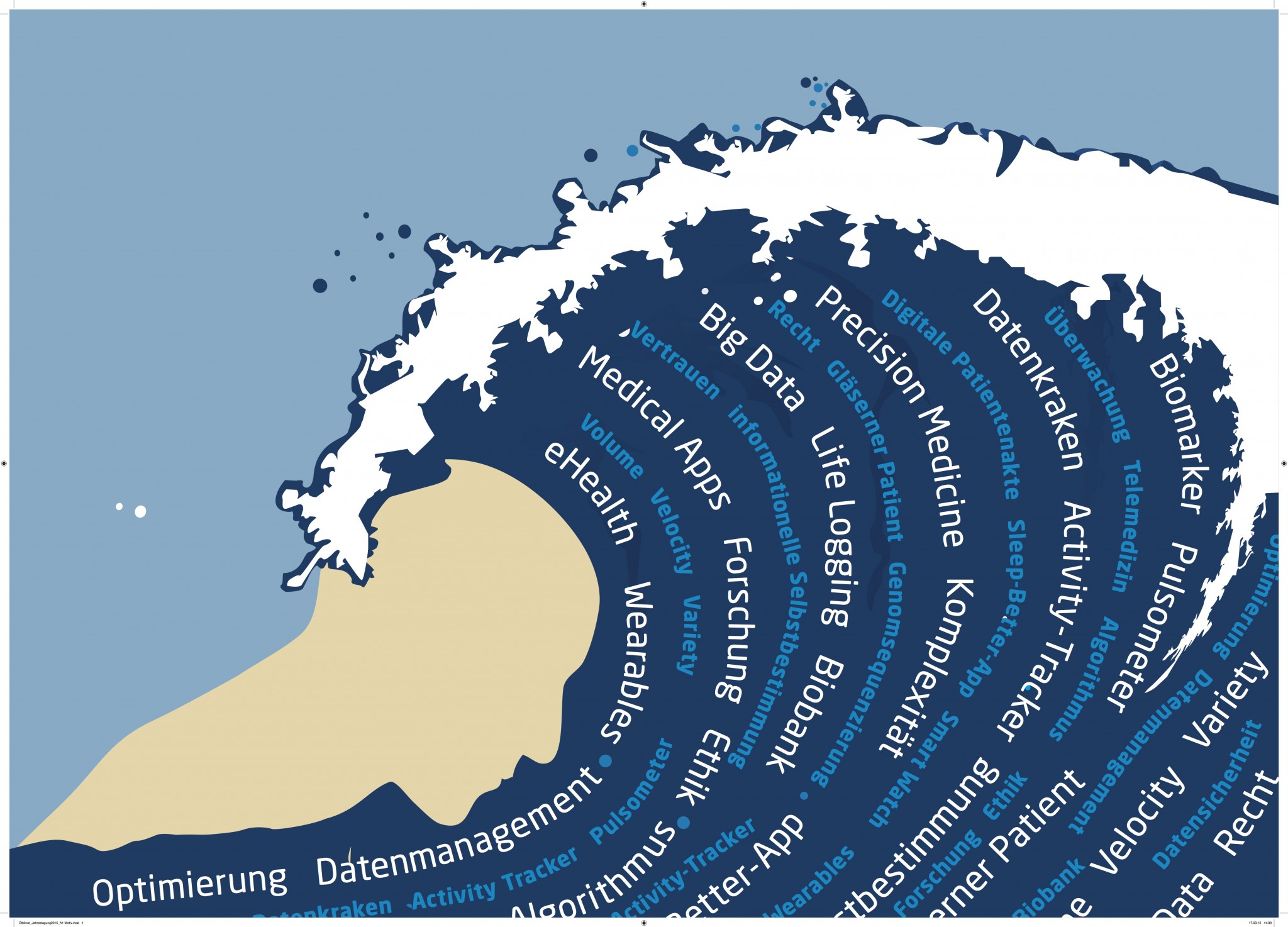
Photo: German Ethics Council
With new technologies for tracing COVID19 infections, Joe Toscano says people deserve transparency and accountability from tracing apps, and the Collaboration on International ICT Policy in East and Southern Africa echoes that call in asking African governments to respect privacy in Covid-related surveillance efforts.
The global appetite for data is deepening – and not only for pandemic tracking. That extends to data related to use of public resources. Benjamin Holzman and Desteo Mugabi introduce us to Nigeria’s financial transparency portal – the country’s most comprehensive effort yet, pooling data building on financial transparency requirements for 800 government Ministries, Departments and Agencies. In Mexico, INAI, Mexico’s transparency and data protection regulator, has created the Contrataciones Abiertas tool that allows open contracting data from the entire procurement cycle to be uploaded and visualized.
Reflecting on the rush to create data infrastructure for COVID-19 case tracking, a World Bank team reflect on what could be achieved if all development data was released as quickly. They urge investment in statistical capacity and robust national data systems – a message no doubt to be repeated in the World Development Report 2021 on Data for Better Lives (don’t forget to send in your comments on their draft concept by end of this month).
Right now, the pandemic is likely to slow data reporting for global initiatives, but it’s good to see the Extractive Industries Transparency Initiative release their 2020 Progress Report, illustrating advances in a variety of advances in reporting. As many nations struggle economically, and despite a web of challenges, some have found new ways to increase the efficiency of their reporting; Nigeria, for example, has published their report in record time.
Nevertheless, there is clear room for improvement. Miles Litvinoff and Stephanie Rochford at Publish What You Pay call for better reporting on the environmental and social impact of extractive companies. At least one voice from the EITI board calls for a new focus on energy transition and tracking shifts in resource dependency levels.
The Web as Civic Tool
The pandemic has underscored the relationship between internet access and access to other rights, such as freedom of speech, online association, and education. In response to these challenges, Sam Bocetta advocates for recognizing internet access as a human right. Thomas Vink calls the pandemic “a crisis for digital rights”, and highlights a COVID19 litigation fund that advances cases against digital rights violations in pandemic response measures. (The first round of applications for this fund are due by June 28th.)
The urgency of protecting civic freedoms was made clear this past week, with legal crackdowns on political opposition and bloggers in Belarus and continued fallout from the conviction of Maria Ressa in the Philippines including a judges association defending the integrity of the decision while a film celebrating her efforts wins top prize at a New Zealand documentary film festival.
Diego Garcia-Sayan, Allyson Maynard-Gibson and Willy Mutunga highlight a broader concern about the justice sector amid a global emergency. They point to a justice gap for the poor and marginalized, justice systems that are resistant to change. It’s time for justice ministers to reorient systems to be people-centric and to innovate.
Going big picture, what about the state of civic trust in democratic governance? Dalia Research’s Democracy Perception Index 2020, which highlights a widespread concern with basic freedoms during COVID19, global fear of election interference, and more. Somewhat reassuring that a majority in all countries surveyed think democracy important to have in their country. More concerning that 40% of all people living in democracies believe that their country is not actually democratic.
How do civil society groups navigate this tough climate? In their content series on resiliency, Partners Global remind us of the Resiliency + framework they developed in 2018. Now with new timeliness and now with a curated list of multi-media resources for each of the 7 resiliency factors. For UK international NGOs, Matt Jackson wonders if the “perfect storm” of a pandemic, the merging of DfID with the Foreign and Commonwealth Office, and the Black Lives Matter protests can create an opportunity to reimagine the sector, truly shift power to Southern allies and forge a more equitable role going forward. A useful prod for us all to read.
Essential Watching: Realizing democracy: policymaking as powerbuilding

Photo: K. Sabeel Rahman, President of Dēmos
An interesting discussion convened by Stanford Social Innovation Review and Ford Foundation on the importance of tying policies to programmatic decision-making and stakeholder participation; democratizing and expanding community control of public goods; and creating more responsive, accountable governments.
Philanthropic double down?
It is not only international NGOs prompted to do some reflection by the events of this year. Funders, too, have much to ponder. The good news is that the pandemic has revealed a nimbleness in response that some might be surprised by. Yet will foundations return to business as usual? Catherine Cheney looks at the likelihood that funders will stick with their commitment to flexible funding – something that Hewlett Director and TAI Chair, Dana Hovig, urges.
What about using their voice not just their chequebook? TAI has a new collective voice working group and have been reading up the report on foundation roles in policy influence (as featured recently in the Weekly), so we were very interested to read ex-TAIer Ruth Levine’s take. We hope foundation heads are reading as she urges two goals for international programming: “first, strengthening the accountability of public policymakers to their own citizens; and second, improving the capacity of governments to implement evidence-informed policies and practices that permit them to fulfil the commitments they make to those citizens.”
Another hot topic for funders amid overlapping crises – how to better support social movements. We featured some resources on this last week and now Theo Sowa of the African Women’s Development Fund discusses how funders can engage with activism and social movements – and why they should. Meantime, in this podcast episode, Rob Reich probes the unsavoury elements of philanthropy and its relationship with justice and offers thoughts on how it can improve.
Sam Marks reflects on a first collective giving campaign for donor-advised fund account holders that suggests the potential for what donors can accomplish when they coordinate their efforts, while at the same time raising fundamental questions about the purpose of philanthropic platforms. Other funding challenges related to the pandemic will continue in coming months, as philanthropic organizations assess the state of their budgets.
How are and should funders respond to the pandemic consequences? Watch the latest virtual Technology Salon digging into just that question (both what to fund and particularly how) – and including the thoughts of TAI’s Michael Jarvis.
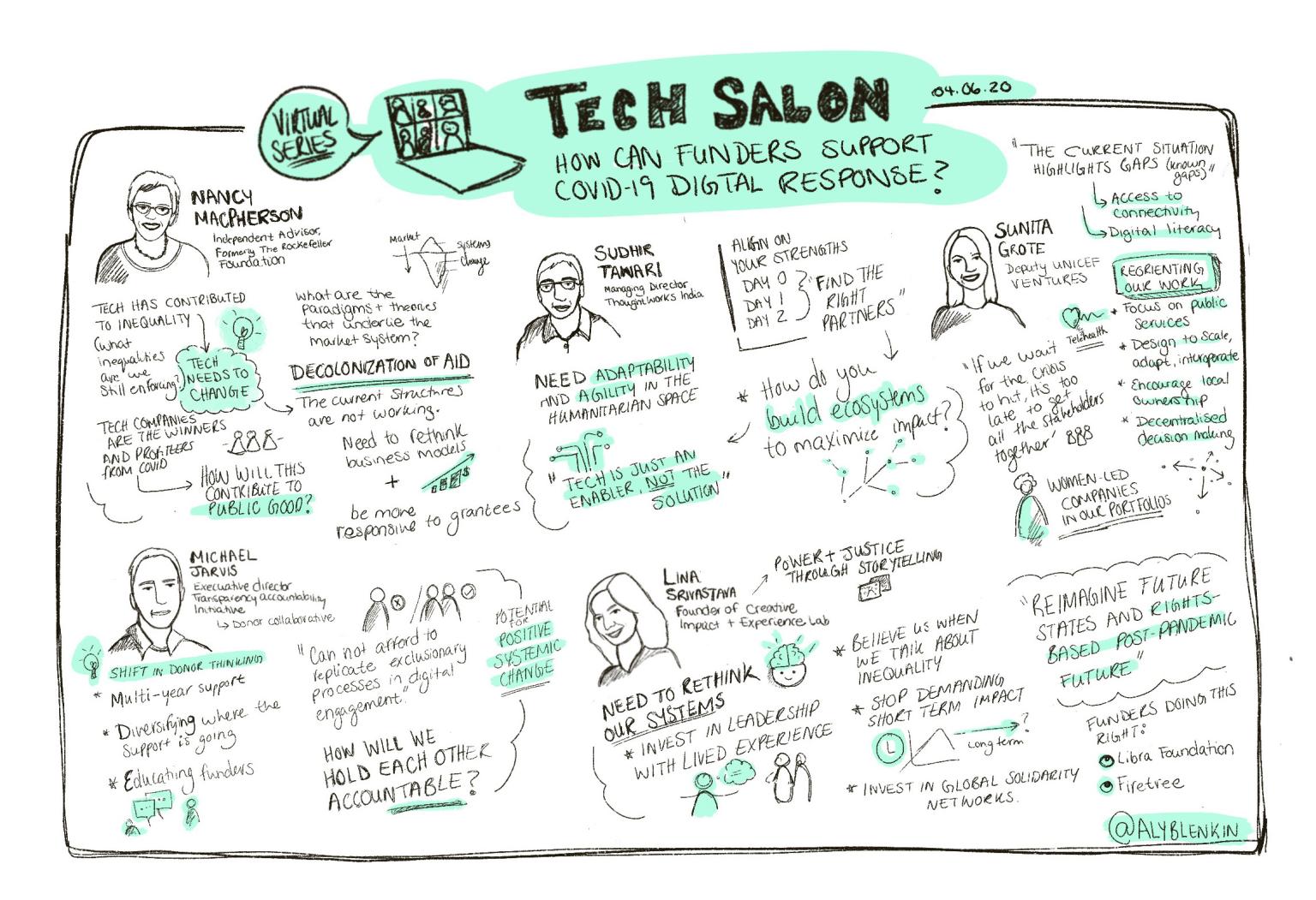
Just ask nice
Finally, a few follow-ups to last week’s feature on tax. It seems the economic fallout of COVID19 has already worsened the effects of widespread tax avoidance practices, and governments are trying new ways to address losses. Pakistan will look to leverage aid and loans in its new 2020-21 budget rather than levy taxes to make up for the shortfall due to the pandemic. For a satirical look at the other side of the coin, check out this song on the super-rich getting stuck with tax liabilities due to COVID19 strandings.
One strategy to ensure tax compliance may almost seem too simple: just ask nicely. World Bank research shows that people are more likely to pay their taxes if you just simply ask them the right way, with tailored communication to taxpayers.

The saga of developing a more appropriate digital tax regime took yet one more turn this past week. OECD Secretary-General Angel Gurría highlighted the challenges as prospects for a multilateral solution look ever more distant. The US administration walked out on the negotiations increasing the likelihood of bilateral taxes coming into effect and retaliatory measures. When digital firms have been one of the few beneficiaries of this pandemic, it will be interesting to see if public pressure can be mobilized toward paying a fairer tax burden.
TAI Spotlight: Making governance more than good
Making governance more than good | Transparency and Accountability Initiative (TAI)
For the last few decades, the phrase “good governance” in the development context has been a catch-all phrase for improving not only a state’s processes but by implication leading to improvement in the lives of its citizens – but that time may be past. Richard Dion argues that to make accountable governance work, a results-oriented approach must be its backbone, with the increasing diversity of governance indices handy.
A moment of reckoning and reflection in the global fight for racial equality | Ford Foundation
We are witnessing a global reckoning as people speak out against histories of colonialism, systemic racism, sexism and anti-blackness that impede equality. Ford Foundation’s Tanya Coke and Nicolette Naylor write on this moment of reckoning and reflection in the global movement for racial equality.
To build back better, we need civic innovation | Luminate
President of New Media Ventures, Taren Stinebrickner-Kauffman argues that immediate relief efforts are crucial, but to shift the structures of power, we must support projects that can shape the world we want to live in. Luminate has also renewed its support with a $1M commitment to New Media Ventures.
Open Society Welcomes Court of Justice of EU Ruling on Hungary Anti-NGO Law |Open Society Foundations
The Open Society Foundations celebrates a ruling from the Court of Justice of the European Union that repeals a 2017 Hungarian law targeting independent NGOs. The Foundation considers it a victory for the civil society.
International development and foreign office to merge | DFID
UK Prime Minister, Boris Johnson announced that DFID will be dissolved and folded into Foreign Office under a newly named Foreign, Commonwealth and Development Office. Critics are concerned that a focus on international poverty reduction will be overtaken by domestic foreign policy interests.
Juan Salgado joins MacArthur Board | MacArthur Foundation
Chancellor of City Colleges of Chicago and a 2015 MacArthur Fellow, Juan Salgado has been elected to serve on the Foundation’s Board of Directors starting September. The Board sets policies and strategy for the Foundation; approves grantmaking areas, initiatives, and grants; and oversees investments and the audit process.
- Job listingsJob postings at Ford Foundation – Ongoing
Job postings at Luminate – Ongoing
Job postings at Democracy fund – Ongoing
Job postings at Wikimedia Foundation – Ongoing (and mostly remote)
Facilitation co-lead – Citizens’ assembly on COVID – Ongoing - Government Affairs Senior Policy Advisor, International Financial Institutions at Oxfam – Ongoing
- Director of Development and Solidarity Philanthropy at Grassroots International – Ongoing
- Senior Communications Coordinator at Grassroots International – Ongoing
- Reset. Information control fellowship – July 1, 2020
Reset. Resident fellowship – July 1, 2020 - Open Contracting Partnership, Head of Advocacy – July 14, 2020
- Open Contracting Partnership, Community Manager – July 20, 2020
- Calls/OpportunitiesBetterTogether Challenge for innovators – Ongoing
Call for research proposals: Tax and civil society – Ongoing
Free Digital Security Training – Ongoing
Open Road Alliance Charitable Grant and Loan to organizations responding directly to COVID-19 – Ongoing
Call for submissions to SSIR Series: Social change in an era of extreme polarization – Last Thursday of every month until early 2021
Pulitzer Center Coronavirus news collaboration challenge – Applications will be reviewed on a first-come, rolling basis
Call for proposals: Informality, tax, and the state – Proposals accepted on a rolling basis
Change Leaders in Philanthropy Fellowship – (application opens on June 2020)
Call for papers: Are emergency measures in response to COVID-19 a threat to democracy? – June 30, 2020
Proposal: Working together to improve governance and anticorruption (Central and Eastern Europe focused) – June 30, 2020
Reset our future fund for organizations and people using technology, research, and education that help tackle these challenges – July 1, 2020
Apply for the Reset Surveillance Capitalism Fellowship before July 1.
IBM call for Code Covid-19 Global Challenge – July 31, 2020
Amartya Sen essay contest 2020: Illicit financial flows – August 31, 2020
Calendar
- Transparency International: 19th International Anti-Corruption Conference – (Postponed)
The State of Global Human Rights – June 24/25 (Depending on time zone) 8pm ET US.
2020 Neighborhood Funders Group National Convening (philanthropy support to grassroots power building) – June 29 – July 1, 2020 (Washington, DC) - OECD – Tax Transparency in Africa – June 25, 2020 (Online)
- WE EMpower UN SDG Challenge 2020 – September 18 – 27, 2020 (New York City, United States of America)
The 2020 Journalism Funders Gathering (funder-only gathering) – October 6-7, 2020 (Philadelphia, United States of America)
Humanitarian and Development Data Forum – November 2-4, 2020 (Chambery, France)
International Open Data Conference –November 18-20, 2020 (Nairobi, Kenya)
